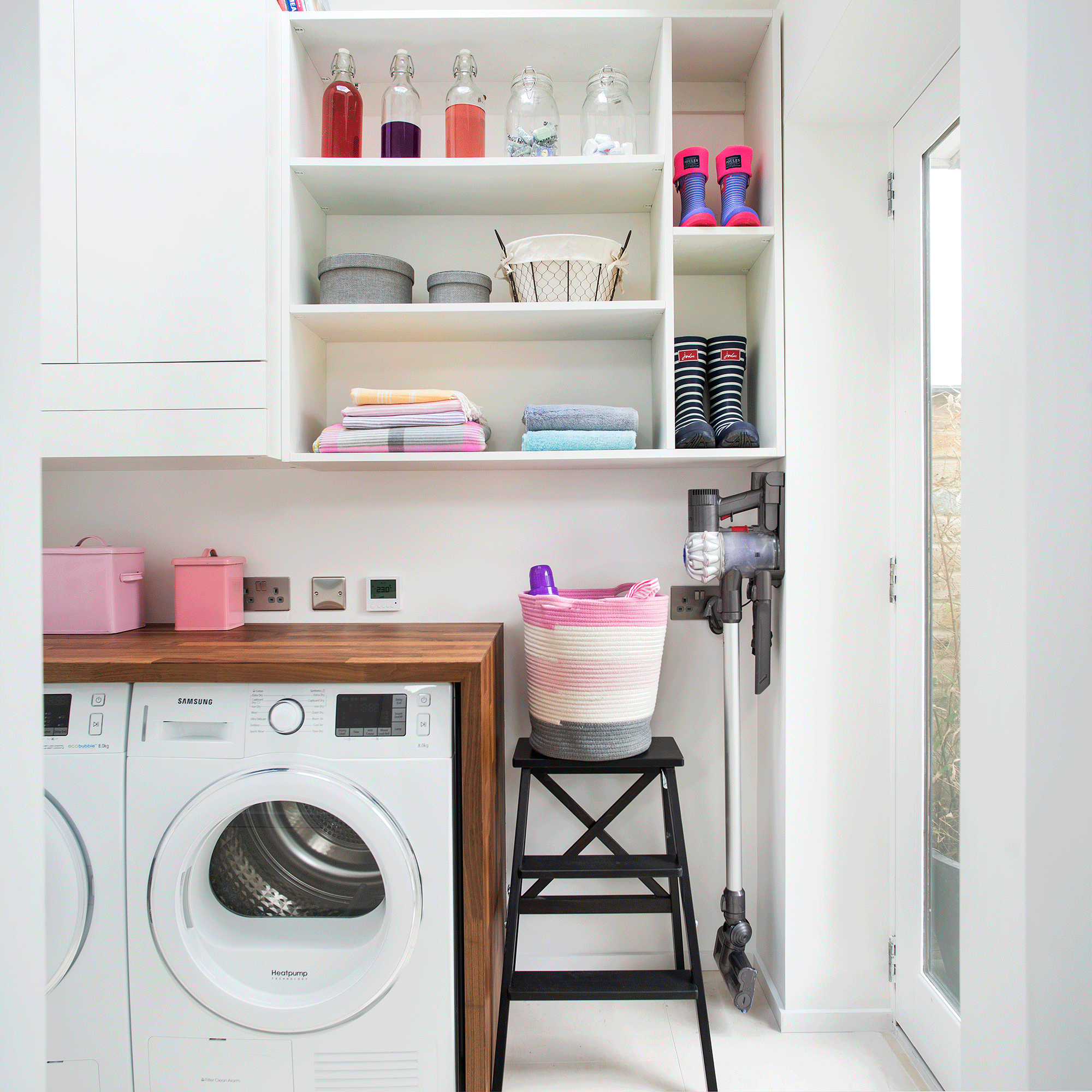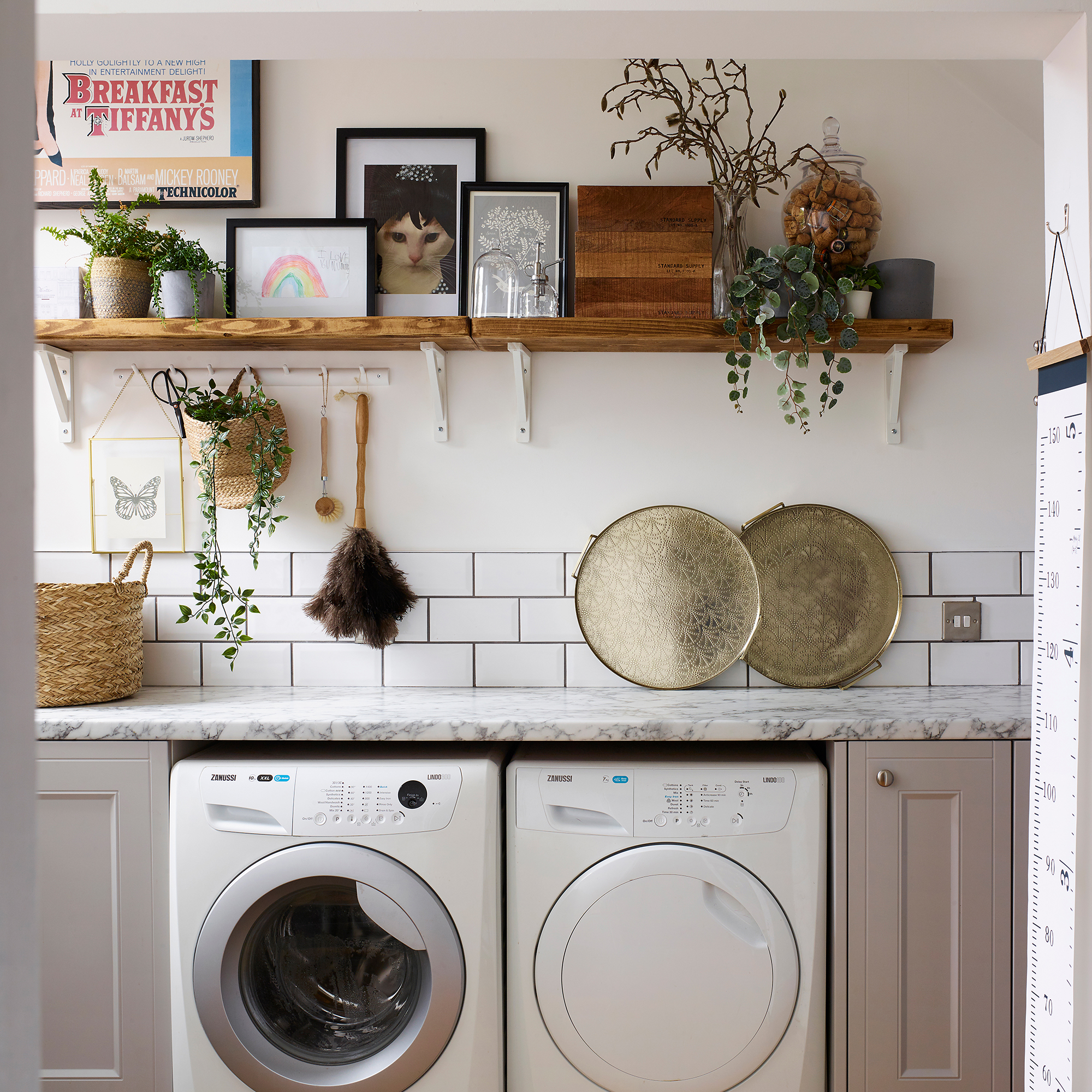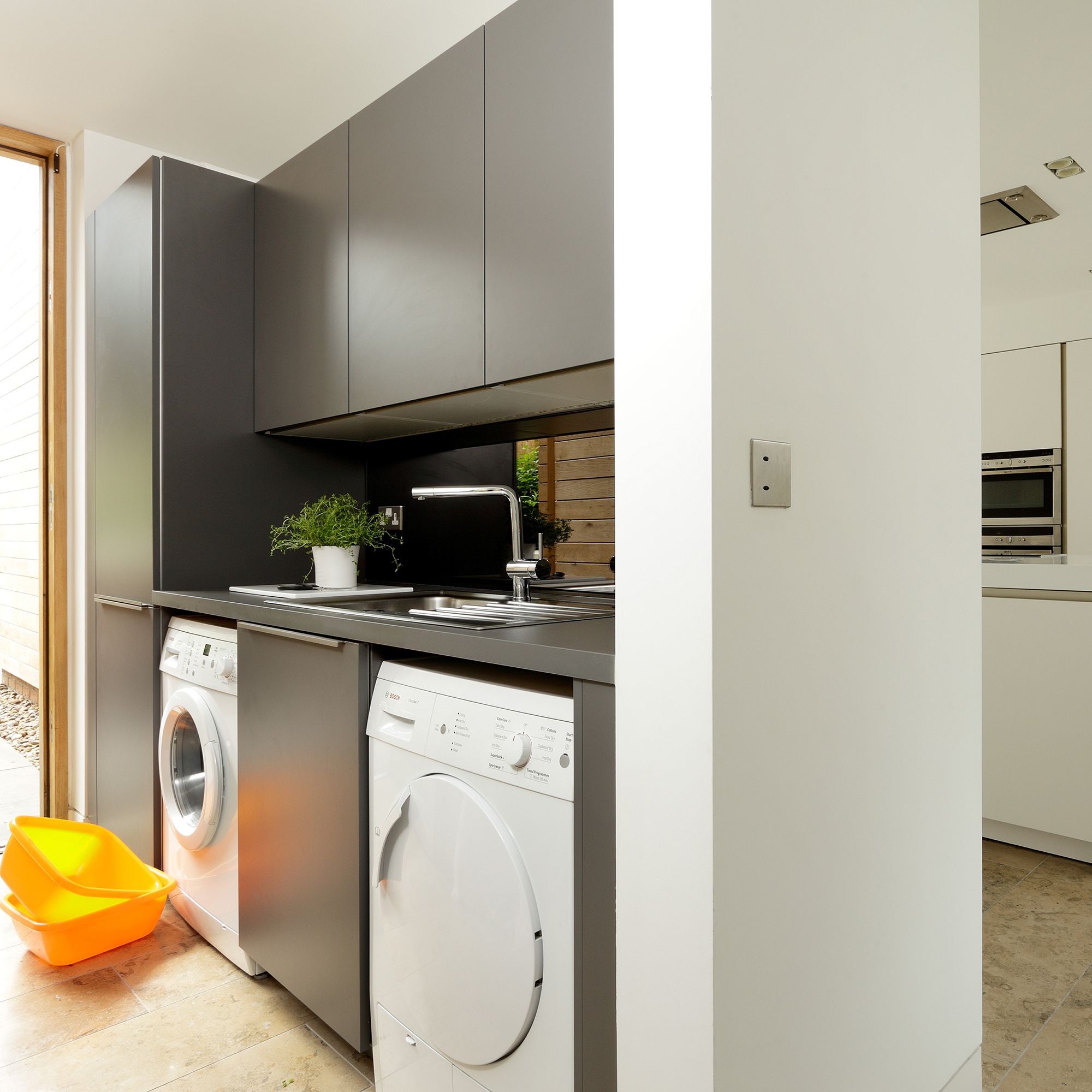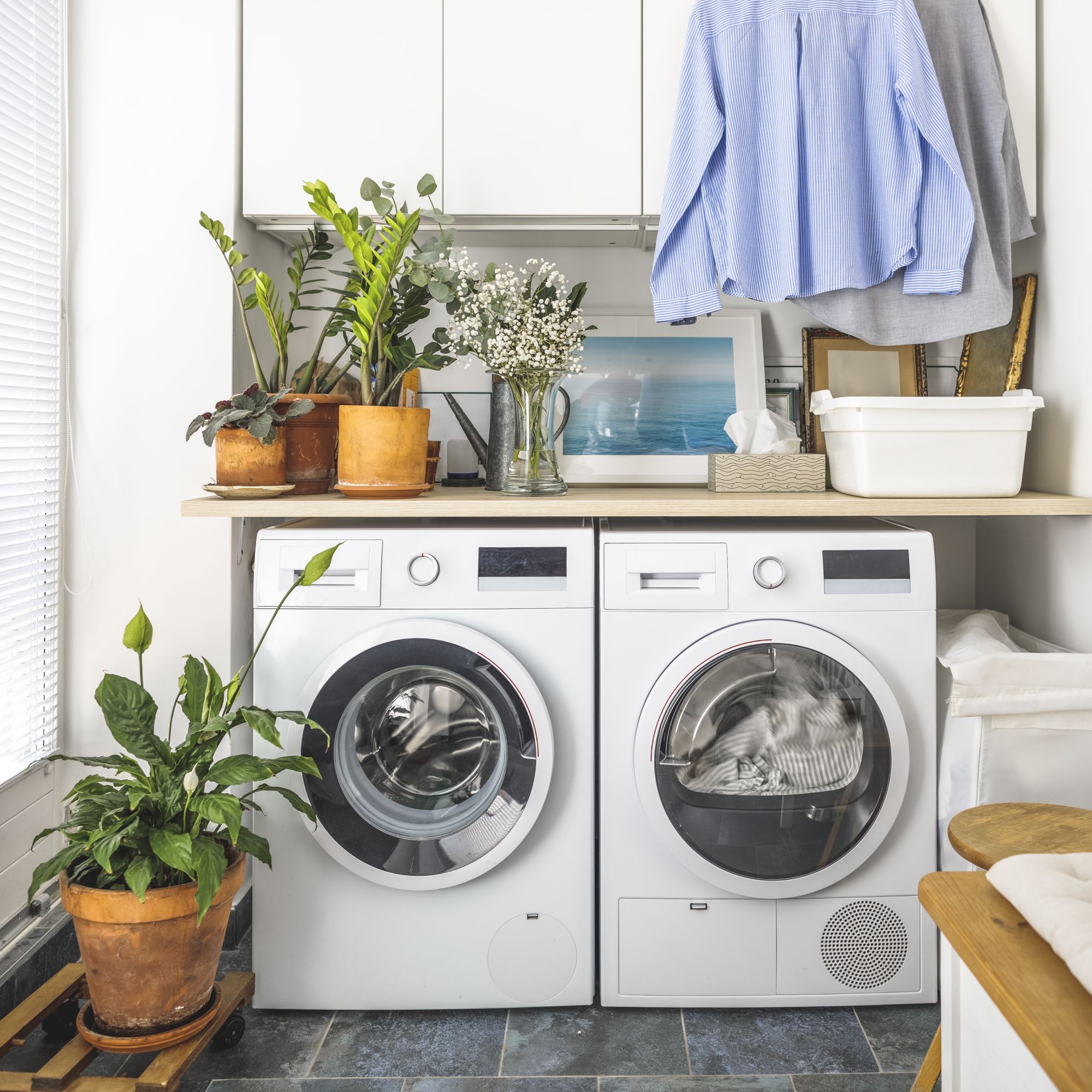How to fix a noisy washing machine yourself – 7 expert ways to get it to work quieter again
If your washing machine is currently louder than you'd like, learn how to fix it with our expert tips


Sign up to our newsletter for style inspiration, real homes, project and garden advice and shopping know-how
You are now subscribed
Your newsletter sign-up was successful
EDITOR’S NOTE: An earlier version of this article included a quote from a purported expert whose credentials we have not been able to verify. The quote has been removed. We regret this lapse in our verification process and have updated our internal protocols to reduce the risk of recurrence.
Nobody wants to listen to loud screeching noises every time they do their laundry, but unfortunately, washing machines can sometimes have a little hiccup and end up producing more noise than they should. If this sounds familiar, you're probably wondering how to fix a noisy washing machine so you can go back to doing your wash loads in peace.
Even the best washing machines can be guilty of being a little too noisy sometimes. It could be caused by something as simple as a loose coin that you forgot was in your pocket banging around the drum, or it could be that the driver belt or pump needs replacing, which requires a little more work.
But the good news is that you can learn how to fix a noisy washing machine yourself. Our guide is packed full of expert knowledge that will take you through the common causes of noisy washing machines and how to resolve them.

How to fix a noisy washing machine yourself
What you'll need
- Cleaning cloths, like this pack of 4 for £6.99 from Amazon
- Toothbrush (for cleaning) - stock up with a multi-pack of bamboo toothbrushes for £5.99
- Spirit level, like this one for £6.81
- Screwdriver - we recommend getting a pack, to ensure you have one that will fit (this 6 pack from Phillips should cover all bases)
- Torch - use the one on your phone, or invest in a proper one like this LED-powered rechargeable torch for £11.99
1. Check for loose items
The first thing you should do is check for any loose items which may be causing the noise, like coins, for example. Grab a torch and shine it around the drum so you can see any small items that may have got wedged into the holes.
Check inside the rubber seal at the entrance to the drum as well. If you find anything that shouldn't be there, you've found the culprit causing the loud noise. Remove the item and try running the washing machine again.
2. Clean the filter

If you know you're not the best at cleaning your washing machine, next on the list of learning how to fix a noisy washing machine is to pull the filter out and give it a good clean. It's recommended that you do this at least every 4 months.
When was the last time you had a look at your washing machine's filter? We often neglect this because it's not an area we see visibly day to day, but if there are loose items hiding in there, your washing machine is going to make a louder noise than usual.
Sign up to our newsletter for style inspiration, real homes, project and garden advice and shopping know-how
Clean the filter with a damp cloth and soapy water, and rinse it out in the sink. Grab an old toothbrush and give it a good scrub too. This has an added safety bonus, too, as cleaning the filter can help extend the machine's life, while a built-up filter is a fire risk.
3. Level the washing machine

A common cause of a noisy washing machine is its location. Even if you've only started experiencing loud noises recently, washing machines can actually move from their original position over time, and it may now be knocking against a wall or be sitting on a slightly uneven surface.
'The feet of a washing machine should be firm against the floor,' Tim Warren, a DIY expert from Adkwik says. 'If you need to adjust the feet, you will firstly need to undo the locking nuts so that the feet can be unscrewed. Use a spirit level to check that the machine is level, and keep adjusting the feet until you find a position that you are happy with.'
Remember to re-screw the nuts back into place before using the machine again.
4. Redistribute the load
If your washing machine doesn't make loud noises consistently, it may be improperly loaded. This is quite common, as we have a tendency to throw our garments in without taking the time to distribute them properly. And try not to fill the drum so it's more than three quarters full.
'If your device is not loaded correctly, it can cause the drum to spin unevenly, resulting in a loud banging noise,' explains Barry Gray, Founder, The Tools Square. 'To fix this issue, you'll need to redistribute the load in your machine so that it is balanced and not overloading in one area.'

5. Check the drum bearings
'One of the most common causes of a noisy washing machine is a problem with the drum bearings,' says Barry. 'These bearings allow the drum to spin smoothly and quietly, but over time they can become worn or damaged, resulting in a loud, thumping noise.'
To check the drum bearings, remove the front panel with a screwdriver. Check the drum bearings to see if they are worn, damaged or discoloured in any way. If they need replacing, you can do it easily enough with a socket set, a wrench, and a pair of pliers. The noise should have calmed down once you've swapped the drum bearings for a fresh pair.
6. Replace the drive belt

'The drive belt connects the motor to the drum and allows it to spin,' says Barry. 'If the belt is loose or damaged, it can cause a loud, screeching noise.'
To fix this issue, you'll need to locate your machine's drive belt. Remove the back panel with a screwdriver; if there are no screws, remove the lid of the washing machine instead. You should be able to see the belt stretched around the drum to the motor at the bottom. If it's not attached properly or looks worn in any way, it will need replacing.
You can buy replacement driver belts from most DIY shops; just check to see if it can be used with your model. Wrap the new belt around the motor spindle at the bottom, then around the circumference of the drum. The infuriating screeching noise should have be all but gone next time you do your laundry.
7. Check the pump
The last trick with learning how to fix a noisy washing machine is to check the pump, which is responsible for pumping water from the drum into the drain hose. Problems with the pump usually cause leakages, but it will also create an unpleasant grinding or grating noise if not working correctly.
If you've tried all the other tricks on our list, it's worth trying to replace the pump. Once you've located the pump (it's usually in the bottom corner), you'll need to disconnect it from the drain hose, then unscrew the pump from the machine. Replace the old pump with a new one, and reconnect it to the drain hose. This can be a messy job, so have plenty of towels to hand to mop up any spillages.
FAQs
Why does my washing machine make so much noise when spinning?
There are a few reasons why your washing machine could be making excess amount of noise when spinning. Firstly, note that some washing machines are simply louder than others because of their unique internal mechanisms. But if your washing machine is making more noise than it did before, it's likely due to a recent change.
'The noise from the washing machine becomes louder when items get caught in the drum, or by washing ‘an unbalanced load’ – a bath towel with a couple of T-shirts, or any other combination of heavy and light fabrics,' says Currys. 'But it could also be a sign there is a problem with the bearings.'
Worn drum bearings are a common cause of noisy washing machines. 'To check your bearings, turn the washing machine drum by hand when it is empty and not being used. If it feels as though you’re pushing against something, you have a problem.'
What does a washing machine sound like when the bearings have gone?

'If the bearings of a washing machine have gone, the machine will begin to make unusual noises,' Tim from Adkwik says. 'It may sound as though it is grinding or rumbling during the spin cycle.'
If your washing machine is making unusual noises during the spin cycle, this is most likely due to an issue with the bearings. Excessive noise and sounds not dissimilar to a jet engine starting is usually a telltale sign, and the machine can also vibrate heavily as well.
Is it safe to use a noisy washing machine?
It's usually still safe to carry on using a noisy washing machine, but be aware that continued use could cause further issues down the line.
'If you keep using the washing machine when there is clearly something wrong, this may lead to further damage,' Tim says. 'The machine could leak and cause water damage, or it may suddenly stop working.'
Washing machine problems such as excessive noise and the washing machine running for longer than the timer are easy to ignore, if the machine is still able to get the job done. But continuing to use the machine as normal isn't the best approach.
'Even if you can continue to use it, it's best to organise for your machine to be repaired - or try to repair it yourself - as soon as possible,' Tim summaries.

Katie has been writing freelance since early 2022, specialising in all things homes and gardens, following achieving a Masters in Media and Journalism. She started out writing e-commerce content for several of Future’s interior titles, including Real Homes, Gardeningetc, Livingetc, and Homes and Gardens. Since then she’s been a regular contributor on Ideal Home’s digital team, covering news topics, how-to guides, and product reviews.